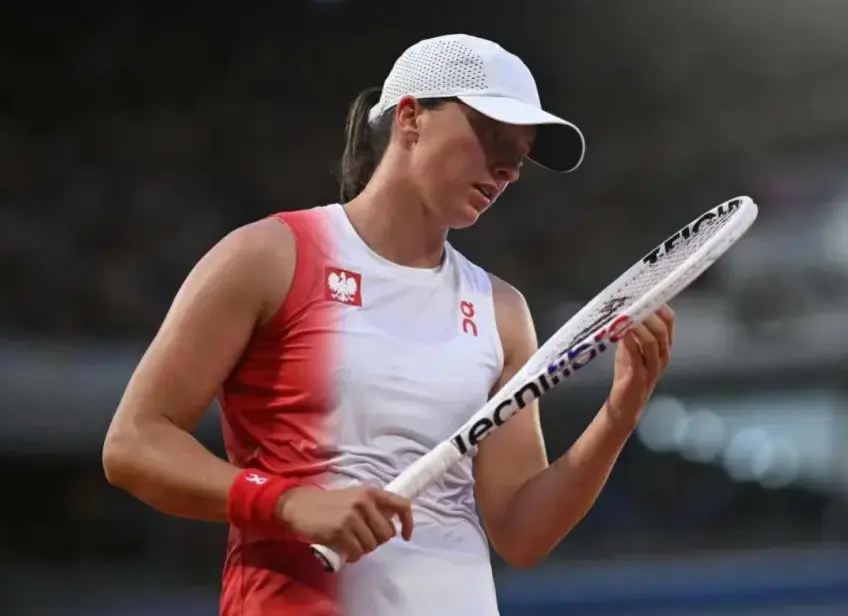
Former World No.1 Offers Key Advice to Iga Świątek Amid Doping Case
Iga Świątek, one of the brightest stars in women’s tennis, finds herself navigating one of the most challenging moments of her career. The 23-year-old, who has held the world No. 1 ranking multiple times and has five Grand Slam titles to her name, recently faced scrutiny over a doping case. While Świątek has maintained her innocence and the circumstances surrounding the case suggest no deliberate wrongdoing, the situation has cast a shadow over her stellar career.
In the aftermath, former World No. 1 Andy Roddick has stepped forward to offer advice to Świątek, urging her to draw on the experiences of fellow players who have weathered similar storms. Roddick highlighted the importance of seeking guidance from Jannik Sinner, the current World No. 1, who earlier this year faced his own doping controversy.
Sinner’s case stemmed from the accidental ingestion of a banned substance, leading to a temporary suspension. However, his swift cooperation with anti-doping authorities and transparency in addressing the matter helped him recover his reputation and focus on his game. Roddick believes Świątek could benefit from understanding how Sinner handled the emotional and professional challenges such allegations bring.
Understanding the Context
Świątek’s case involves a banned substance reportedly found in her system through contamination in a sleep aid she used to manage jet lag during a demanding travel schedule. The tennis star has long been known for her professionalism and dedication to clean sport, which makes the circumstances surrounding this incident particularly difficult for her.
The governing body overseeing her case concluded that her violation was unintentional, resulting in a relatively short suspension. However, the fallout from doping allegations extends far beyond the suspension period. Świątek now faces the challenge of rebuilding trust with fans, sponsors, and peers, all while maintaining her focus on returning to competitive form.
Lessons from Sinner’s Experience
Roddick’s suggestion to turn to Sinner is rooted in the Italian player’s ability to navigate his doping case with composure and strategy. When faced with allegations, Sinner adopted a proactive approach: he issued clear statements to the public, cooperated fully with investigations, and focused on letting his performances speak for themselves upon his return.
Świątek, who has always been a vocal advocate for integrity in sport, is likely to find parallels in Sinner’s journey. Both players are known for their mental toughness and ability to rise to challenges, qualities that will be crucial as Świątek works to move past this setback.
The Broader Implications
Doping cases, even those stemming from accidental ingestion, often spark debates about the fairness and consistency of anti-doping regulations. Critics argue that athletes can fall victim to unintentional violations due to the strict liability principle, which holds them accountable regardless of intent. This principle, while necessary to uphold the integrity of sport, places an immense burden on players to scrutinize every supplement and medication they use.
Świątek’s case has reignited calls for reforms to anti-doping protocols. Many believe there should be greater emphasis on distinguishing between intentional cheating and accidental contamination, with corresponding adjustments to sanctions. For Świątek, this controversy could provide an opportunity to advocate for such changes, using her platform to bring attention to the challenges athletes face under the current system.
Mental Resilience in Tough Times
The psychological toll of a doping case can be as significant as the professional repercussions. Świątek, who has often spoken about the importance of mental health in tennis, will need to rely on her support system to navigate the public and media scrutiny. Her team, which includes experienced coaches and advisors, will play a critical role in helping her stay focused on her long-term goals.
Moreover, Roddick’s advice highlights the value of peer support. Conversations with players like Sinner, who understand the unique pressures of such situations, could offer Świątek both practical advice and emotional reassurance.
Looking Ahead
Despite this setback, Świątek remains one of the most talented and resilient players on the WTA Tour. Her ability to bounce back from challenges has been a hallmark of her career, and there is little doubt she will approach this situation with the same determination.
The tennis world will be watching closely as Świątek returns to competition, eager to see how she channels this adversity into future success. If history is any indication, Świątek is likely to emerge from this experience stronger, with renewed focus and a deeper understanding of the responsibilities that come with being at the top of her sport.
In the meantime, her willingness to confront the issue head-on and her openness to learning from others are promising signs. Świątek’s journey serves as a reminder that even in moments of difficulty, there is an opportunity for growth and transformation.
A Legacy Beyond the Court
While Świątek’s immediate priority will be to resume her winning ways, the lessons from this experience could shape her legacy in unexpected ways. As she works to rebuild her reputation, she has the chance to become a leading voice in the ongoing conversation about fairness and transparency in anti-doping efforts.
Ultimately, Świątek’s response to this challenge could define not only her career but also her impact on the sport as a whole. By turning adversity into advocacy, she could emerge as a powerful force for positive change in tennis, inspiring others to navigate their own challenges with integrity and resilience.
Leave a Reply